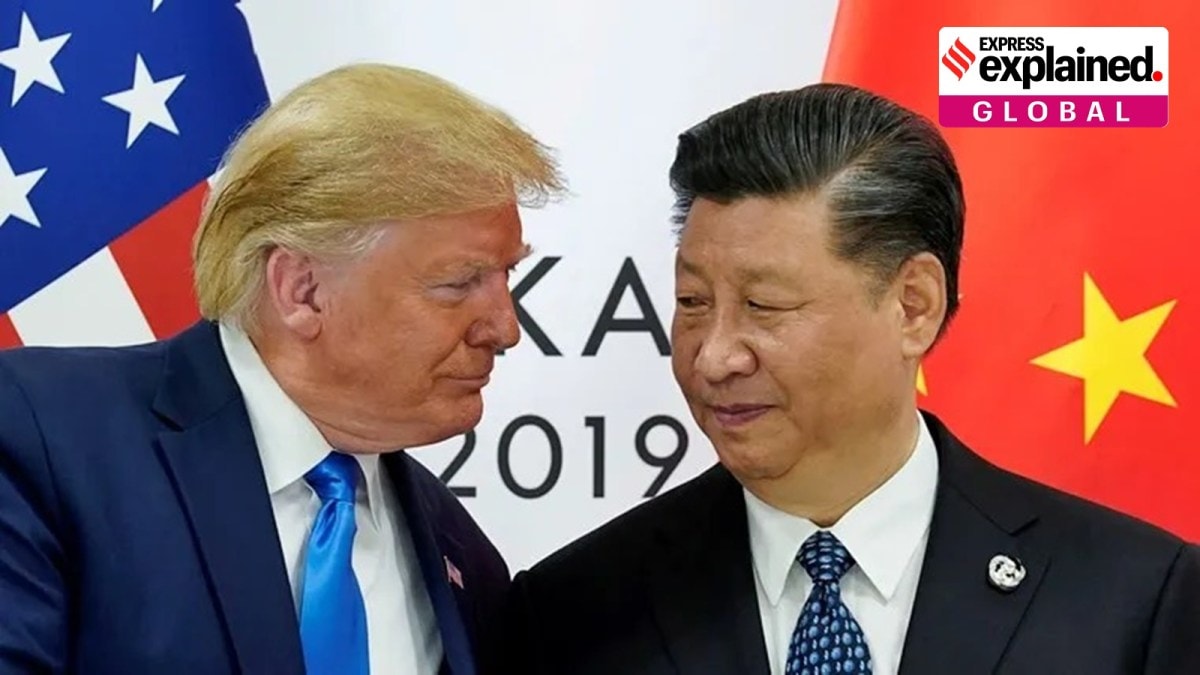China reaction to US tariffs: Why Beijing is playing the long game over a zero-sum game
Unlike in 2018, this time, China was prepared for the sanctions announced by the Trump administration. Also, Beijing is not too worried about a trade war with Washington. What are the reasons for this optimism? An expert explains.

From policymakers to experts, no one in China doubted that the Donald Trump 2.0 administration would hit the Asian giant hard again, especially in trade and tariffs. So, much before the US presidential election on November 5, China already had a Trump-strategy in place — as an old Chinese saying goes, prepare early instead of waiting for the storm to come.
On February 1, citing unchecked trafficking into the US of fentanyl and illegal immigration, the Trump administration announced its first set of 10% additional tariffs on Chinese exports to the US (along with 25% new penalty tariffs on imports from Canada and Mexico).
China’s reaction — the announcement of retaliatory tariff but not much fire and brimstone in rhetoric — has made it clear that Beijing was prepared for this tariff escalation for a long time.
Besides, as well-known US academic and former senior advisor at the US Department of State, Jessica Chen Weiss, recently observed, both the political elite and the intelligentsia in China seems quite aware that Trump intends to use the tariffs to “shape Chinese behaviour” to suit US interests, and not as an economic end in themselves.
The two rounds of tariffs
When Trump on January 21 announced the additional 10% tariffs on China, effective from 1 February, policymakers and experts were quickly busy analysing the differences between the previous (2018) and the current tariff regimes. Differences include 1) unlike in 2018, now the tariffs included all Chinese products, including goods valued at less than $800 that were earlier exempt; 2) this time, Trump also threatened to increase or expand the scope of tariffs if other countries were to adopt retaliatory measures.
Because the tariffs imposed by Trump on China in 2018 were not cancelled during Joe Biden’s term, the current tariffs on China’s exports to the United States are relatively high. Bo Chen, a senior researcher with the National University of Singapore’s East Asia Institute, agrees with mainland China scholars that “given the existing penalty tariffs, the total US tariffs on Chinese products would amount to approximately 35%.”
Why Beijing has reasons for optimism
The biggest damage to China caused by the tariff initiated in 2018 was China losing its two-decade-long status as the top exporter to the United States (surpassed by Mexico in 2023).
But ruling out a complete decoupling under Trump 2.0, scholars in China are quite optimistic, at least in business and trade, of a non-confrontationist China policy under the new US administration. They base their optimism on the corresponding trade figures between China and the US in 2018 and 2024, respectively.
Even Jessica Chen Weiss, cited above, thinks there are “voices within Trump’s economic team who are more inclined to see the threat of tariffs” move Beijing toward a new trade deal with Washington.
In 2018, China exported US$478.42 billion to the United States and imported US$155.10 billion. In 2024, China’s exports stood at US$524.656 billion, while it imported US goods worth $163.624 billion. More importantly, as many Chinese scholars note, during the trade war under Trump’s first term, the two countries “were fighting and talking at the same time.” Similarly, they expect, both sides will continue to negotiate even as they impose tariffs on each other.
Moreover, scholars in China refer to a slew of positive developments and statements from both sides to justify their optimism. These references include Xi-Trump phone conversation on January 17; Trump’s invitation to Xi Jinping to attend his inauguration; Trump’s remark while nominating David Perdue as the new US ambassador to China that “he (Trump) wants to have a productive relationship with the Chinese leaders”; and Trump’s announcement to the media after taking oath that “he plans to visit China within the next 100 days.”
US-China tariff war: Zero-sum game or a long game
In summary, given that China’s top leaders and policymakers firmly believe that the US economy has been in inexorable decline, and that Trump is talking tariffs with allies too, Beijing need not worry too much about a trade war between Washington and Beijing.
Beijing has over the past several years focussed on internal consolidation and gradual economic recovery. As a recent commentary in Foreign Policy in Focus has observed, “China strategy suggests a willingness to let Trump make the first move. Beijing also knows the four-year timeline limiting Trump’s ambitions.” Hence, Xi has the luxury of opting for a patient, deliberate playing of a long-game over a zero-sum game.
Hemant Adlakha teaches Chinese at the Jawaharlal Nehru University in New Delhi. He is also Vice Chairperson and an Honorary Fellow, Institute of Chinese Studies (ICS), Delhi.